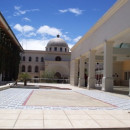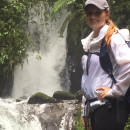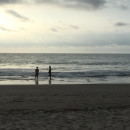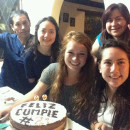Challenges, Growth, and Happiness in Quito Past Review
By Dakota (Trinity University) - abroad from 01/02/2017 to 05/17/2017 with
IES Abroad: Quito - IES Abroad in Quito
As the title of my post suggests, I encountered numerous challenges while abroad. Not every day was a dream vacation. Looking back though, I learned and grew from every challenge. Who knows- I may never have an opportunity like this again, so I am so thankful that I took it. I became incredibly close to my host family, and still talk to them regularly. I took classes similar to what I would have taken at my home university, but with a different perspective. My Spanish skills improved, but more importantly my confidence to use my language skills was greatly boosted. As a whole, it was challenging, but OH SO WORTH IT!!
Review Photos





Personal Information
| How much international exposure did you have prior to this program? | 0-2 weeks |
Review Your Program
|
* Overall educational experience
Academic rigor, intensity, resources, etc. |
Some of my classes were challenging, but in general, they were much easier than courses at my home university. All of my classes counted toward my major, so they were "real" classes. I had friends who took all pass/fail classes designed for international students. They had very, very easy semesters. |
|
* Host Country Program Administration
On-site administration of your program |
In general, the program ran well. There were some lapses in organization, but those did not negatively affect my studying abroad experience. |
|
* Housing:
How satisfied were you with your living arrangements? |
I lived with an incredible family! I became very close to my family members, especially my host mom. I could tell that the student life coordinator for the IES Quito Program devoted much time and energy to finding good host families. |
| * Food: |
My host mother was an excellent cook. I felt I was able to experience typical Ecuadorian, middle class food. Sometimes it was traditional food, other times it was more modern/Americanized food. My only complaint is that my food was not as healthy as I would have liked it to be. |
|
* Social & Cultural Integration:
How integrated did you feel with the local culture? |
|
|
* Health Care:
How well were health issues addressed during the program? |
|
| * Safety: |
Quito is a semi-dangerous city. The biggest danger that most travelers and students run is being pick-pocketed. Multiple students had their iPhones stolen from them while we were there. Our program informed us of safety risks, though, and following their suggestions and using common sense, I never felt threatened. Before deciding to study in Quito, women (and men, I suppose) should be aware that "machismo" culture is alive and well in Ecuador. It is not uncommon to be cat called, honked at, or stared at by men on the street. Most of the time that is the extent of it. Sometimes men will make outright offensive comments or noises if you pass them on the street. Again, I never felt threatened, but thick skin was necessary. |
| If you could do it all over again would you choose the same program? |
Yes
|
Finances
|
* Money: How easily were you able to live on a student's budget?
(1 = not very easy/$200+ on food & personal expenses/week, 2.5 = $100/week, 5 = very easily/minimal cost) |
Services were very inexpensive in Ecuador. Haircuts were $3- $5, bus rides were 25 cents, hostels were $10- $15 per night, and taxis and cross-country bus rides were also inexpensive. Products, though, especially clothes, shoes, or other imported items were more expensive than they are in the U.S. All things considered, I was able to live on a very tight budget in Ecuador. |
| Not including program expenses, about how much money did you spend on food and other expenses each week? | $25 for an average week. $100 on weekends with travel |
| Do you have any general money-saving tips for future study abroad participants? | Eat at home as much as possible. You have already paid for all of those meals. Most families are also willing to pack lunches or send a few dollars if your schedule requires you to be away from the house at meal time. |
Language
| * Did your program have a foreign language component? | Yes |
|
How much did the program encourage you to use the language?
0 = No encouragement, 5 = frequent encouragement to use the language |
I did the Direct Enrollment Program, and studied at a local university, so I had to use my Spanish all of the time! Most locals (besides professors) do not speak English. Any interaction with cashiers, bus drivers, street vendors, etc. was in Spanish. I also exclusively spoke Spanish with my host family. |
| How would you rate your language skills at the beginning of the program? | Advanced |
| How would you rate your language skills at the end of the program? | Fluent |
| What was the highest level language course you had completed prior to departure? | Several advanced courses |
| How many hours per day did you use the language? | |
| Do you have any tips/advice on the best ways to practice the language for future study abroad participants? | Even if your host family members speak some English, ask them to speak only Spanish with you. Be conscientious of the tendency to speak English with your American friends. You are all trying to improve your Spanish, so speak it with each other! |
Other Program Information
|
* Where did you live?
Select all that apply |
|
|
* Who did you live with?
Select all that apply |
|
|
* Who did you take classes with?
Select all that apply |
|
| About how many local friends did you make that you will likely keep in touch with? |
A Look Back
| * What did you like most about the program? |
|
| * What could be improved? |
|
| * What do you know now that you wish you knew before going on this program? | The American perspective is not the only perspective. The American way is not the only way. Living in another culture and taking classes that specifically explored the notions of globalization, capitalism, colonization, and perspective, my thinking was transformed. I have always been open to new ideas, but before this experience, I was unaware of how one-sided my perspective truly was. |
Reasons For Studying Abroad
| To help future students find programs attended by like-minded individuals, please choose the profile that most closely represents you. |
The Academic or LinguistYou went abroad with specific academic goals in mind; the program credentials and rigor of your coursework abroad were very important to you. You had a great time abroad, but never lost sight of your studies and (if applicable) were diligent with your foreign language study. Good for you! |








